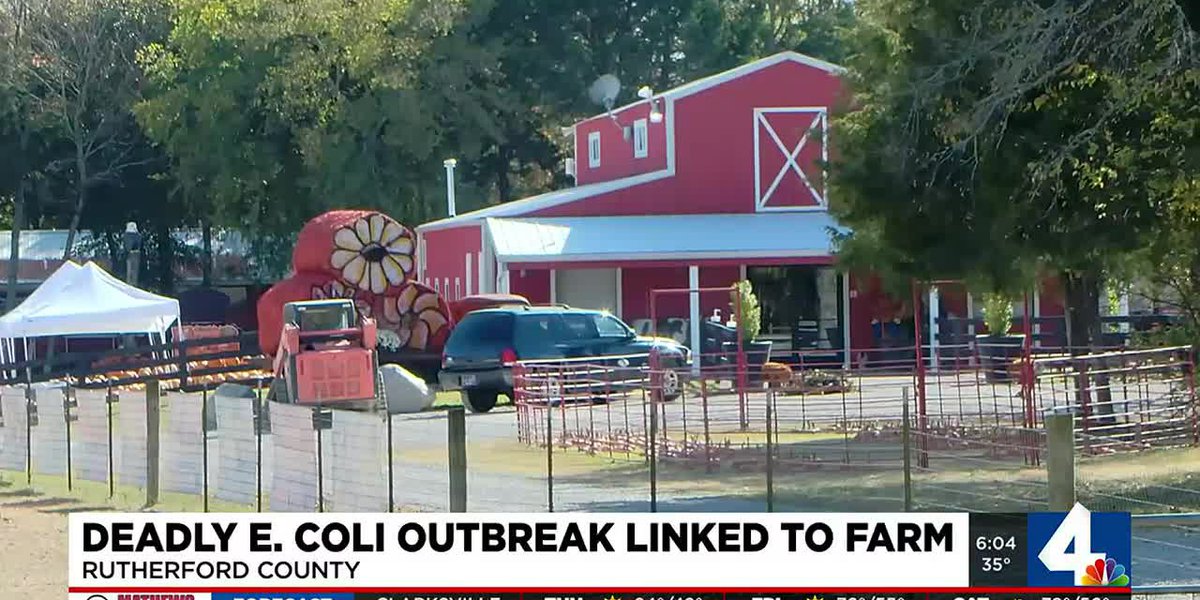EAGLEVILLE, Tenn. (WSMV) – An outbreak of the dangerous bacteria E. coli in goats at a popular Rutherford County animal farm this summer led to the death of a child, according to a newly released report from the Tennessee Department of Health.
The TDH conducted an outbreak investigation after confirming two cases of STEC, or Shiga Toxin-Producing E. coli, related to a goat husbandry summer camp at Lucky Ladd Farms in June 2022.
The TDH report confirmed out of 82 attendees to the summer camp, three cases of E. coli were confirmed, two primary and another secondary. The secondary case was a 2-year-old whose older brother attended the camp.
The 2-year-old eventually developed hemolytic uremic syndrome (HUS) and was killed by the infection, the report said. A total of 14 probable cases were identified with the median age of 6 years old.
“The bacteria E. coli is present in every human being on the planet,” Vanderbilt University Medical Center Dr. William Schaffner said. “It’s in their intestinal track. It’s part of their feces. We poop out E. coli by the billions every morning. However, there are certain strains of E. coli that are more dangerous than others.”
Dr. Schaffner said severe outbreaks of E. coli are rare but can spread quickly by ingesting the bacteria. E. coli can cause lasting symptoms and even lead to organ failure.
“That’s why if we are going to some place like a petting zoo, take along some hand sanitizer and periodically get Junior away from petting those wonderful animals and squirt some hand sanitizer into their hands,” Dr. Schaffner said.
Deadly E. coli outbreak traced back to farm summer camp. A report from TDH shows two goats at the camp transmitted the bacteria to children caring for them.
The farm voluntarily closed on June 25 and the TDH performed a full evaluation of the facility, including interviews with ownership and staff, and samples were taken from nearby water sources and food that is typically served to visitors.
The source of the STEC was traced to two baby goats that were in contact with the confirmed cases. Those goats were euthanized, and the barn used to house them was demolished.
Seattle-based food safety attorney Bill Marler is representing three of the infected families, including the parents of the two-year-old that died. He has requested additional documents from the TDH, county and farm as part of a separate private investigation leading up to possible legal action.
“Their investigation was very thorough,” Marler said. “There is unequitable evidence that the illnesses, all of the illnesses the 14 both confirmed and probable, emanated from this petting zoo facility, and obviously with some tragic consequences.”
Marler said it was traumatizing for his clients and they still struggle to talk about what happened. They want more to be done to prevent something like this from infecting more people.
“None of them had any idea that they were sending their children into a place where they could get sick and possibly get a bacteria that could cause death,” Marler said. “The E. coli was not just on these animals. They found it on a post. They found it within that environment. It clearly was a bacteria that spread in the environment there that put all of these kids at risk and all of their families at risk.”
The farm reopened fully for business on July 21, three weeks after voluntarily closing. The goat husbandry component is no longer a part of their program.
Lucky Ladd Farms released a statement regarding the outbreak on their Facebook account:
Copyright 2022 WSMV. All rights reserved.
Note:- (Not all news on the site expresses the point of view of the site, but we transmit this news automatically and translate it through programmatic technology on the site and not from a human editor. The content is auto-generated from a syndicated feed.))



